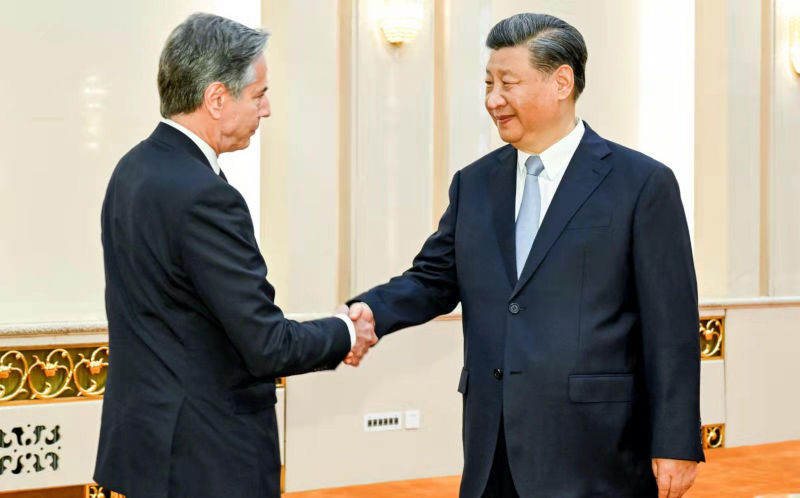The recent visit to China by US Secretary of State Anthony Blinken seemed promising, until we learned what he really had in mind: a long war with no finish line.
This was not how the Australian media reported what happened during more than seven hours which Blinken spent with Chinese Foreign Minister Qin Gang and Wang Yi, Director of Foreign Affairs in the Chinese Communist Party Central Committee. The visit culminated in a meeting between Blinken and President Xi Jinping.
Reporting glowingly on the 19 June event, Voice of America enthused about the US seeking peaceful coexistence with China. Blinken, it reported, told his Chinese hosts that America does not support Taiwan independence. Rather, he reiterated ‘the long-standing US one China policy’.
Readers in Australia could be excused for recalling 1971, when Prime Minister McMahon castigated Gough Whitlam for taking the initiative to open diplomatic relations with Beijing, unaware that Henry Kissinger was doing the same. Except that this time, Blinken had made Australia seem to be the laggard. The Australian media’s anti-China ‘Red Peril’ war rhetoric suddenly looked out of date.
Some wondered if the US had forewarned its loyal ally to expect this apparent departure from President Biden’s recent pronouncements on Taiwan. Whether it had or not, if the US was repairing its relations with China, it could either mean AUKUS is no longer required, or could leave Australia stranded with the huge AUKUS bill for no purpose.
As it turned out a week later, Blinken’s real line on China and Taiwan is much closer to Biden’s. The President has repeatedly said he would be willing to use force to defend Taiwan, and has made critical comments about China. Biden appears to consider Taiwan among countries such as Japan and South Korea, to which Washington has made explicit defence commitments. The President has said that the US has a ‘rock-solid’ commitment to defend the island if it is attacked by China. Whenever he makes such statements, State Department officials are quick to say the policy has not changed, while some analysts say Biden’s remarks are gaffes and claim he has ‘misspoken’.
The United States is required by the Taiwan Relations Act of 1979 to provide Taiwan with the means to defend itself, which Australia is not. But Washington, like Canberra, has a policy of ‘strategic ambiguity’ on whether it would intervene militarily to protect Taiwan in the event of a Chinese attack. Yet in November 2021, Anthony Blinken said the US States and its allies (apparently including Australia) would take ‘action’ if China were to use force to alter the status quo over Taiwan. He accused the Chinese government of deciding that the status quo is no longer acceptable, and of wanting to speed up the unification process.
The Council on Foreign Affairs in Washington has recently reported on ‘US Taiwan relations in a new era’. It recommends that ‘the US must shift immediately to [a] war footing to prepare for war over Taiwan’. Blinken spoke with its president, Richard Haas, on 28 June. So which is the real Blinken: the one who met Xi, Qin, and Wang, or the one who spoke with Haass?
The latter, apparently. Blinken told Haass that what’s coming is a ‘long-term competition’ with China, over the challenges it poses, with no finish line. America is approaching the competition ‘from a position of strength’ backed by its key partners in Europe and Asia. He went on: ‘We want to make sure that in that competition…to shape this new era, our vision prevails’. Recalling events as far back as 2016, Blinken said China’s military operations, force deployments, exercises, missile tests, and economic coercion against Taiwan were ‘antithetical to the preservation of the status quo’.
In reply to Haass’s question about whether the US would prevent China moving against Taiwan with impunity, Blinken laughed. He repeated the one China policy based on the ‘three communiques, the Taiwan Relations Act, and the six assurances’. Haass also laughed. China, Blinken said, was trying to pry Taiwan out of the international system, ‘stirring the pot’ in a way that was antithetical to the status quo.
Haass then asked about AI and whether the US should deny China certain technologies on the grounds of protecting national security. ‘Or are we actually trying to slow China’s growth?’ Biden replied that as Beijing saw it, America’s purpose was to hold China back globally and economically. He cited recent growth in US trade and investment in China, and the small number of Chinese companies on which America imposed targeted restrictions. Nonetheless, he asked, how is it in the US interest to allow China to get technology that ‘they may turn around and use against us?’ He cited nuclear weapons, hypersonic missiles, and repressive use of AI.
Behind the ‘one-China policy’, it seems, are two China policies. One of them preserves the status quo. The other is designed to perpetuate US dominance, through war over Taiwan if necessary, blaming it on China. Where does that leave Australia?
Dr Alison Broinowski AM is a former Australian diplomat and a member of Australians fr War Powers Reform

